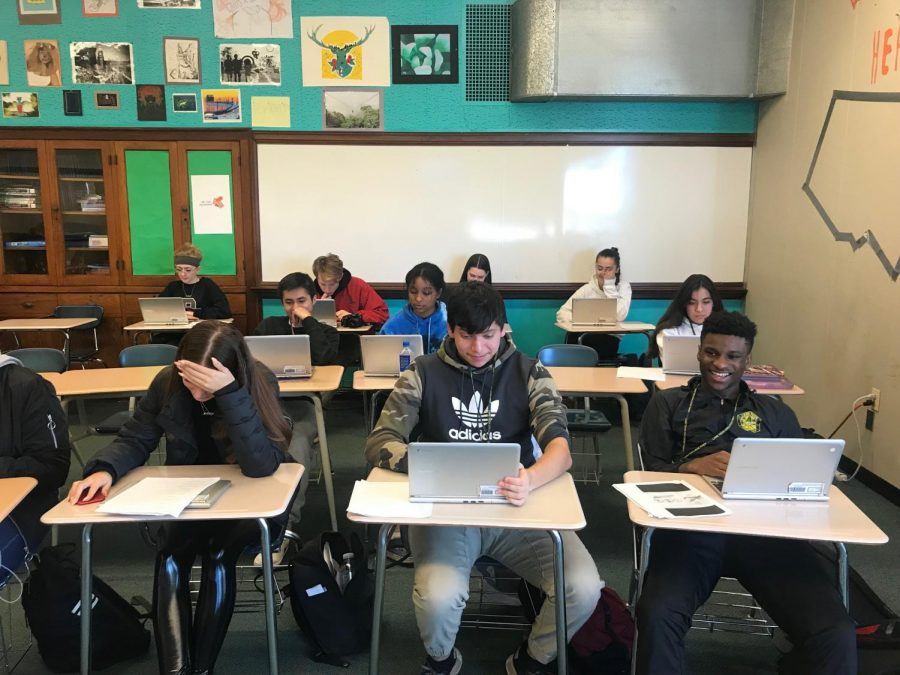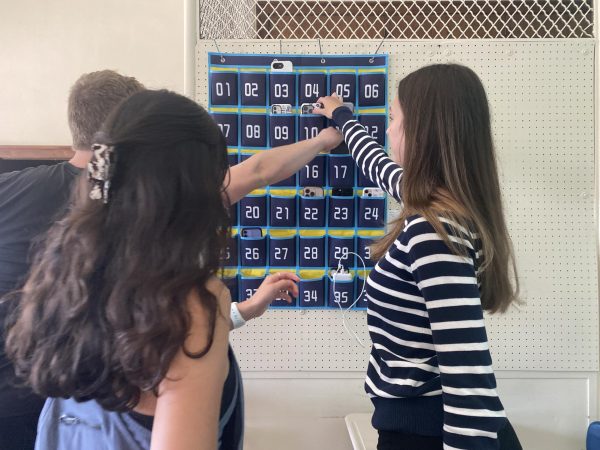Q&A with Mr. Doll about tech in the classroom
Students doing a class activity on computers in Mr. Doll’s class.
Mr. Doll, an AP Psychology teacher, might not tell you to put your phone away in class. From giving his students tests online, to using Quizlet to help with the psychology vernacular required for the AP exam, Doll integrates a lot of technology into his AP Psych class, but his thinking has evolved.
What is your opinion on technology in the classroom?
“I have a mixed opinion on technology. I think that it’s great for engagement, and it’s great for real time feedback. I do feel like kids have some bad habits with technology that come out in the classroom, and it takes a lot of monitoring to keep them away from opening different tabs and going on the websites they want to go on, and things like that. It’s kind of a mixed bag because it’s great in some ways and then if it is used too much or without a clear direction, then the kids will opt out of the lesson and just do their own thing.”
Why did you decide to involve technology in your class more?
“That goes back to college. I went to college for computer science and then when I graduated from college I worked at Kaplan — they do test prep. If you are studying for the GRE or MCAT they’ll give you test prep. They had this program for kids where they used technology, interactive technology, as an after-school tutoring device, so I ran one of their seminars in technology. I thought I would be the one writing the software and turns out I don’t have the talent for that, so now I’m on the other end — the user end of it — but I love it. It changes every year and keeps everything fresh.”
Do you think technology helps the students get more involved and interested in the classroom?
“I think it helps introverts talk in class. I use an anonymous software where I know who’s answering and how they are answering but when I post it to the class, the class doesn’t know. That way when I ask an opening question, I can highlight an answer that needs to be worked on. That way I can work on it without the kids knowing whose answer it is, because if you just say it out loud, everyone knows who answered the question. I think it’s great for introverts — I kind of build a classroom based on that.”
What do you think about the increase in technology?
“I’m for it as long as teachers aren’t using it as a crutch — like saying ‘I don’t have a lesson today, go on a website and tell me about it.’ There’s a lot that needs to be done in terms of training. You need really user friendly software so that teachers aren’t intimidated by the new stuff coming down the pipeline, like Google Classroom.… I think teachers will come around. You know, it’s one of those things that they need to experiment with, and feel safe to do that, but at the same time there probably needs to be more of an education piece so they know how to use it. It kind of gets a bad rap because a teacher will just link to something online and that’s their whole lesson; at that point it’s no different than just having them open a textbook.”
Do you think technology helps more than textbooks or any other studying method for studying purposes?
“It depends on what you’re doing. So studying vocab, it can be really helpful — like Quizlet and all the games and things like that. I have my kids open their textbooks and notecards and read text because it gives them context for their vocabulary, and then I use Quizlet to do all the games. So I think you need to do both. I think there’s no substitute for actually having your eyes pick out information from a textbook or a reading, or actually listening to the teacher as they are talking and writing it down. There’s no technology that’s going to put information into your head…. But I think a lot of kids when they say ‘studying’ it means that you are learning it for the first time, so that’s the problem — if you just go to Quizlet with no reference, and you just look up a list of words, it’s basically doing nothing for you. If you were not paying attention in class, or if you did not read it somewhere else — like if that’s the first time you’re seeing something — then it’s not going to help you”
Would you like to add anything else?
“I actually recently struggled a little bit with tech. Two years ago I did a flipped class, and I would do all this stuff with technology, and then kids would tell me they were not doing the work. So if I had a class 5th period, they would do 6th period homework because they knew they had computers in my class — so I would be doing my lesson, and they would have a tab open, and they would be working on their homework or assignment for next period. So kids were kind of opening up about it. I used to give my tests online, and I caught some kids cheating — they would open up tabs and they would just start googling the questions and stuff like that. But the reason why I do my test online is because everything is all tied up to their student ID number so when they hit enter they know exactly what they got. The next day I can just hit a button, and when they open the test back up, it has their entire test, what they got right and wrong, and then I can cherry pick questions out and re-ask them as a follow-up and if they get those right. It just replaces their score. And I can do all that, as long as they don’t cheat — because then if they cheat, then I have to get the scantrons out. So there is a double edge factor because it does make it easier for kids to cheat — and kids can abuse and break the Chromebooks, or don’t charge them. So I actually have been trying to get away from it. What I’m trying to do is use it, but be really smart about it.”
Your donations directly fund the Lane Tech student journalism program—covering essential costs like website hosting and technology not supported by our school or district. Your generosity empowers our student reporters to investigate, write, and publish impactful stories that matter to our school community.
This website is more than a publishing platform—it's an archive, a research tool, and a source of truth. Every dollar helps us preserve and grow this resource so future students can learn from and build on the work being done today.
Thank you for supporting the next generation of journalists at Lane Tech College Prep!

Tyrah is a Junior at Lane, this is her second year of journalism. She has taken an interest in ukulele and sports. She is a sports editor....

Renato Arteaga is currently a senior at Lane Tech College Prep, where he engages in activities such as dancing salsa for the Organization for Latin American...




